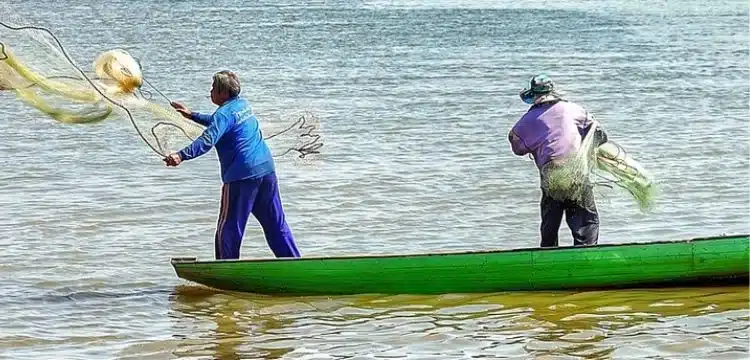[vc_row][vc_column][vc_column_text dp_text_size=”size-4″]The head of a fishermen’s association has emphasized the need for comprehensive policies in Pakistan’s underdeveloped fisheries sector to elevate it to a major industry and grant fishermen the status of industrial workers.
“We urge both federal and provincial governments to create improved policies for marine and freshwater fisheries to transform it into a significant industry. We also request that the government classifies fishermen as industrial workers, entitling them to the associated benefits,” stated Ghulam Mustafa Miran, Chairman of the Pakistan Fisherfolk Forum (PFF)
Read more : PM hopes policy continuity from caretakers
He emphasized the importance of conducting thorough research on various fish species and their breeding as an immediate step to revitalize this long-neglected sector.
Miran urged policymakers to work towards lifting the ban on fish exports imposed by the European Union due to hygiene concerns and by the US, which alleged the catching of turtles in fishing nets. He clarified that local fishermen do not catch turtles, and many have installed devices to release turtles if they become ensnared in their nets. He stressed that the growth of this industry could significantly contribute to the national economy.
Miran noted that approximately 2.5 to 3 million fishermen and women make their living by fishing in 1,209 freshwater lakes across different districts in Sindh, as well as in the open sea.
With around 4 million fishermen and women nationwide, including 3 million in Sindh and Balochistan, the industry is a substantial source of livelihood for many poor people.
Miran pointed out that coastal erosion was a significant problem, causing the loss of 40 acres of land daily in Thatta, Sujawal, and Badin, with around 2.5 million acres of land already lost.
He also urged the implementation of Article 73 of the UN Convention on the Law of the Sea as a goodwill gesture to release fishermen from Pakistan and India who inadvertently cross sea boundaries, leading to arrests and detentions ranging from six months to ten years.
Dr. Abdullah G Arijo, a noted biologist, highlighted Pakistan’s rich fishery potential along its northern Arabian Sea coastline and the need for promoting aquaculture, ornamental fish, fish feed production, and increased fish breeding.
In response to the concerns raised by the fishermen’s body and the biologist, Dr. Ali Muhammad Mastoi, the Director General of Fisheries for Sindh Marine and Coastal Development, mentioned efforts to grant fishermen laborer status and initiatives to promote fisheries and research. He also emphasized the importance of improving sanitation and preventing the intrusion of water boundaries by fishermen for successful fish exports. Private companies are also engaging in marine and freshwater aquaculture in various areas of Sindh, further promoting the industry’s development.[/vc_column_text][/vc_column][/vc_row]











